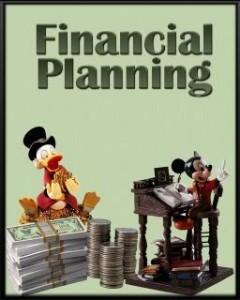Posts Tagged ‘financial planner’
Posted on: May 18th, 2010 by Amy Bolger
 Starting a business can help you save money on your taxes. However, beyond choosing what business to go into, you also have to decide on the best form for your business: a sole proprietorship, an S corporation, a C-Corp, or a limited-liability company (LLC). Speaking with a financial planner or CPA specializing in small businesses may help you make the best choice; your choice will have a major impact on your taxes. If you have children and your business is unincorportated, hire them – it will have great tax benefits. You can deduct what you pay them, thus shifting income from your tax bracket to theirs. Since wages are earned income, the “kiddie tax” does not apply. And, if the child is under age 18, he or she does not have to pay Social Security tax on the earnings. Starting a business can help you save money on your taxes. However, beyond choosing what business to go into, you also have to decide on the best form for your business: a sole proprietorship, an S corporation, a C-Corp, or a limited-liability company (LLC). Speaking with a financial planner or CPA specializing in small businesses may help you make the best choice; your choice will have a major impact on your taxes. If you have children and your business is unincorportated, hire them – it will have great tax benefits. You can deduct what you pay them, thus shifting income from your tax bracket to theirs. Since wages are earned income, the “kiddie tax” does not apply. And, if the child is under age 18, he or she does not have to pay Social Security tax on the earnings.
Starting a business can be quite costly; make sure you watch start up costs when starting your business. Generally, the costs of starting up a new business must be amortized, meaning, deducted over years in the future. But you can deduct up to $5,000 of start-up costs in the year you incur them, which is when the tax savings may be the most helpful to you.
If you choose to do your new business’ taxes on your own, make sure you don’t fall into the trap of filing certain costs as hobby costs rather than for-profit business. If you want to file deductions as hobby costs, you still have to report any earnings as income, but there are restrictions on deducting expenses and you can’t deduct a loss. To avoid this problem, run your activity in a business-like manner, including having a separate bank account and having business cards printed.
If you run your own businesses, you ten to have a lot of flexibility at year-end. To push the receipt of income into the following year , delay mailing bills to clients until late in December that payment is received after December 31. Or, pay business expenses before January 1 to lock in deductions.
If you decide to run your business out of your home, don’t be afraid to use that deduction. You just have to use part of your home regularly and exclusively for your business, you can qualify to deduct as home-office expenses some costs that are otherwise considered personal expenses, including part of your utility bills, insurance premiums and home maintenance costs. Some home-business operators steer away from these breaks for fear of an audit. But if you deserve them, claim them.
If you feel comfortable starting the business and filing all the taxes on your own, make sure you take advantage of all your possible deductions. If you are at a loss as to what form of business will work best for you, don’t want to be bothered with the financial planning or taxes with regard to the business, hire a respected business planner and/or CPA. Either way, starting a business can save you money.

Tags: business expenses, cpa, financial planner, linkedin, new business, small businesses
Posted in CPA Rockvile, Financial Planning Rockville |
No Comments »
Posted on: May 12th, 2010 by Amy Bolger
 When you think about it, couples don’t fight over love; they fight over money. They fight because one person didn’t balance the checkbook or made a dumb investment without consulting the other. They fight because one partner exerts dictatorial control over the money, or because one has secretly amassed thousands of dollars in debt on a credit card. Whether the issues are big or small, money will prove a powerful force impacting your marriage. What couples don’t always understand is that money is rarely the real culprit. It’s the lack of communication, often stemming from a lack of knowledge about each other’s personal financial status and beliefs. With that in mind, you need to ask the important questions before tying the knot. A major question to ask is what your partner’s assets and liabilities are. This question is paramount because assets and liabilities are the basic building blocks of the financial life you’ll live together. Assets will help you strive for the life you want. The liabilities will hold you back. Your goal should be to pinpoint where you are financially as a couple so that you can map out where you want to go together. When you think about it, couples don’t fight over love; they fight over money. They fight because one person didn’t balance the checkbook or made a dumb investment without consulting the other. They fight because one partner exerts dictatorial control over the money, or because one has secretly amassed thousands of dollars in debt on a credit card. Whether the issues are big or small, money will prove a powerful force impacting your marriage. What couples don’t always understand is that money is rarely the real culprit. It’s the lack of communication, often stemming from a lack of knowledge about each other’s personal financial status and beliefs. With that in mind, you need to ask the important questions before tying the knot. A major question to ask is what your partner’s assets and liabilities are. This question is paramount because assets and liabilities are the basic building blocks of the financial life you’ll live together. Assets will help you strive for the life you want. The liabilities will hold you back. Your goal should be to pinpoint where you are financially as a couple so that you can map out where you want to go together.
Another essential topic to discuss is how you are going to divide the financial responsibilities. Maybe one of you takes charge of investing and the other balances the checkbook. Your wisest move is to play to each other’s strengths. If you’re good at challenging bureaucracy, maybe you agree to handle the insurance companies and the medical bills. The point is that you both have an obligation to the family’s financial well-being, and both of you need to be aware of the household’s financial situation.
Finally, you need to discuss whether or not you want to combine your accounts or operate individually. This is a divisive issue. Many financial pros argue that operating from individual accounts helps maintain marital peace. Since neither partner knows what happens in the other’s account, they believe that less bickering will occur. I say, maybe. You could also make the argument that individual accounts mask the family’s true financial position, which can draw away from the main purpose of marriage: operating as a team. If neither of you know how much money is really flowing through the individual accounts, nor how much is being saved and invested, then it’s impossible to plan a future together. That’s not to say that individual accounts don’t work; they just require a lot of openness. Ultimately, this, along with the other questions, boil down to one thing: communication.

Tags: assets and liabilities, financial planner, financial responsibilities, financial situation, marriage, personal financial status
Posted in Financial Planning Rockville |
No Comments »
Posted on: May 11th, 2010 by Amy Bolger
 People often mistakenly associate the word “estate” with an abundance of wealth or a large home when, in reality, it is relevant to everyone. An estate is everything a person owns when he or she dies, including home and personal property, all investments, whether they be accounts (of all varieties), retirement plans, real estate, or businesses. Most of us have not necessarily been paying much attention to estate tax in recent years because it wasn’t effecting our financial plan. But as of January 1, 2011, the Federal estate tax is scheduled to rise from the ashes. Only $1 million will be exempt with the rest being taxed at 55% (sometimes 60%). With that in mind, we need to start going over the ins-and-outs of estate tax again. People often mistakenly associate the word “estate” with an abundance of wealth or a large home when, in reality, it is relevant to everyone. An estate is everything a person owns when he or she dies, including home and personal property, all investments, whether they be accounts (of all varieties), retirement plans, real estate, or businesses. Most of us have not necessarily been paying much attention to estate tax in recent years because it wasn’t effecting our financial plan. But as of January 1, 2011, the Federal estate tax is scheduled to rise from the ashes. Only $1 million will be exempt with the rest being taxed at 55% (sometimes 60%). With that in mind, we need to start going over the ins-and-outs of estate tax again.
First, assets inherited or received as gifts from a spouse are not taxed; its called the “unlimited marital deduction.” It doesn’t avoid estate tax, it postpones it. Anything that remains when the second spouse dies would be taxable as part of their estate. This just leaves the remaining spouse more to live on while he or she is alive.
One big mistake people make is buying a life insurance policy and naming themselves as the owner. When they do that, the proceeds become part of their estate, only adding to the amount that they are leaving behind. If that total is more than the exemption amount and they left it to someone other than their spouse or charity, it becomes subject to estate tax.
Charitable gifts you make during your life can be much more tax-efficient than gifts through your estate plan. One advantage is that you can take an income tax deduction for the year in which the gift was made. Another benefit is that the donation reduces your net worth and leaves less that could be subject to estate tax. In contrast, if you make a gift in your will, it reduces your taxable estate, but there is no income tax write-off.
Most methods of saving estate taxes require you to totally give up ownership and control over assets, whether you are giving them to people directly or putting them in a trust. If this is the route that you choose to take, make sure you are leaving yourself enough, and to be on the safe side, you should assume you will live to an advanced age.
The biggest mistake people make is failing to make an estate plan. No one is immortal and its a realization we must all come to. You can’t just assume that your loved ones will know what you want done with your estate. And you are also leaving a bigger burden on them if you fail to plan for the pitfalls of the estate tax. We all want what is best for our loved ones, so take the time to plan so that you can care for them when you are no longer here as well.

Tags: estate planner, federal estate tax, financial planner, retirement, taxable estate
Posted in CPA Rockvile, Financial Planning Rockville |
No Comments »
Posted on: May 9th, 2010 by Amy Bolger
 Its easy for our emotions to take over and force us, or rather convince us to make irrational decisions. Our money is not exempt from these decisions. But, you have to remember, from here on out, that you need to only use logic when it comes to finances. Some people can make a go of it on their own, others employ the assistance of a financial adviser. One of the biggest mistakes people make is coming to the conclusion that because its on sale, its a good deal. If you are going stereo shopping and you see two marked at $400, but one is $300 off, which would you buy? If you use your logic and reasoning, you would buy the one that got a better rating from consumer reports; but if you react like most people, you buy the one that is on sale because its a bargain. In fact, research has found that people who wouldn’t normally spend that kind of money on a stereo before will buy the discounted stereo based on the fact that it is discounted. The reality is, $400 is $400, and if you normally wouldn’t spend that kind of money on a stereo in the first place, you shouldn’t do it now. Before you splurge, evaluate whether the product is worth that in enjoyment. Also, consider how often you will use the product and if there is a cheaper product of similar quality out there. Its easy for our emotions to take over and force us, or rather convince us to make irrational decisions. Our money is not exempt from these decisions. But, you have to remember, from here on out, that you need to only use logic when it comes to finances. Some people can make a go of it on their own, others employ the assistance of a financial adviser. One of the biggest mistakes people make is coming to the conclusion that because its on sale, its a good deal. If you are going stereo shopping and you see two marked at $400, but one is $300 off, which would you buy? If you use your logic and reasoning, you would buy the one that got a better rating from consumer reports; but if you react like most people, you buy the one that is on sale because its a bargain. In fact, research has found that people who wouldn’t normally spend that kind of money on a stereo before will buy the discounted stereo based on the fact that it is discounted. The reality is, $400 is $400, and if you normally wouldn’t spend that kind of money on a stereo in the first place, you shouldn’t do it now. Before you splurge, evaluate whether the product is worth that in enjoyment. Also, consider how often you will use the product and if there is a cheaper product of similar quality out there.
The number of people who have money in savings accounts, earning less than 2% I might add, while carrying credit card debt, usually with interest rates above 12%, is mind boggling. People tend to use what is called “mental accounting” and compartmentalize their funds. Often people have the money to pay off their entire debt, but choose not to do so because they are afraid to dip into their savings. The reality is, you are not earning enough interest on your money in savings to justify not paying off your debt. You are losing money everyday in interest. If you have the money to pay off your credit card debt and still pay your bills, do it. Worse case scenario, if there is an emergency, use your now zero balance credit cards to help and then pay them off as soon as you can.
Finally, people have begun hoarding money again as a result of the economic climate. People are so afraid of running out of money, they don’t enjoy the money they have. If you are legitimately worried about running out of money, you should sit down with a financial planner and work out the math. Make sure you consider worst case investment scenarios, not just the averages. That should make you more comfortable about weathering a bad patch in the future. Then, if you still have more than enough, make a plan that will allow you to enjoy your wealth by either spending the excess or giving it away. Money, after all, is a means to an end, not the end. You save it to make you and the people you love calm, comfortable, and happy. Enjoy it!

Tags: accounting, consumer reports, credit cards, financial adviser, financial planner, interest rates, money
Posted in Financial Planning Rockville |
No Comments »
Posted on: April 28th, 2010 by Amy Bolger
 In addition to death and taxes, inflation is another certainty in life. Because of this, it is important to plan your financial future and investments in a way that will maintain your assets purchasing power. One investment, despite the public’s fear, are stocks. Some of the best companies to own during inflation would be those companies that can increase their prices naturally during inflationary periods. Commodity resource companies can be a fairly safe investment as the company’s pricing power will usually only increase during such periods. Look for companies with the largest profit margins. In addition to death and taxes, inflation is another certainty in life. Because of this, it is important to plan your financial future and investments in a way that will maintain your assets purchasing power. One investment, despite the public’s fear, are stocks. Some of the best companies to own during inflation would be those companies that can increase their prices naturally during inflationary periods. Commodity resource companies can be a fairly safe investment as the company’s pricing power will usually only increase during such periods. Look for companies with the largest profit margins.
Real estate is also a great investment when done for the right reason. A lot of people find themselves in a dilemma when their goal is to “flip” a home rather than buying it to live in. Although many real estate investors are able to find hidden value in properties, most individuals do not have this knack and should focus on owning to live in the home for at least a couple of years. Real estate investments do not usually come to fruition over several weeks or months. If you live in your house and pay off your mortgage in the 15-30 yr. period your loan was for, you will then have a debt free asset that will continue to appreciate in value. So, rather than holding on to money in a savings account, which will cause a major loss in purchasing power by retirement, a real estate investment will have the opposite effect.
One of the easiest and best investments to make to secure your future is in yourself. Further your education and learn new skills. This will increase your job security and increase your future earnings potential. This will help to make your future assets/earnings recession proof.
Buying stocks, becoming a homeowner, and enriching yourself with education are all good ways to combat inflation. You should sit down with a financial planner to assess the best plan of action, as well as where to put those funds and when. A reputable real estate agent can help you find the ideal home in the ideal area that will best suit your needs, rather than picking a house that you think is “flippable”. Just remember that as inflation increases at 7%, and your bank account only at 4%, you may feel richer, but you are actually 3% poorer without really knowing it.

Tags: buying stocks, financial planner, inflationary periods, purchasing power, real estate agent, real estate investment
Posted in Financial Planning Rockville |
No Comments »
Posted on: April 26th, 2010 by Amy Bolger
 Frequently changing employers can make it more difficult to save for retirement. The median job tenure of American workers was 5.1 years at the same job in 2008, according to a new study by the Employee Benefit Research Institute. Many pension formulas reward long-term and highly paid employees more than workers with a shorter job tenure. Some job hopping workers also move in and out of retirement plan coverage throughout their career and cash out small 401(k) balances when they change jobs, both of which lead to smaller retirement account balances. Frequently changing employers can make it more difficult to save for retirement. The median job tenure of American workers was 5.1 years at the same job in 2008, according to a new study by the Employee Benefit Research Institute. Many pension formulas reward long-term and highly paid employees more than workers with a shorter job tenure. Some job hopping workers also move in and out of retirement plan coverage throughout their career and cash out small 401(k) balances when they change jobs, both of which lead to smaller retirement account balances.
Some 401(k) plans provide better investment options or charge lower fees than others. 401(k) match formulas also vary considerably among employers and short-term employees don’t always get to keep the 401(k) match. Only 37 percent of 401(k) plans offered immediate vesting in 2008, according to a Profit Sharing/401k Council of America survey of 908 plans, which means you get to keep your employer’s match as soon as it is deposited. Other plans require you to stay with the employer a certain number of years before you can keep the match. Some companies also have a graduated vesting schedule that allows you to keep a certain percentage of your employer’s 401(k) match based on the number of years you have worked for the company. If you leave the company before the match is fully vested you forfeit some or all of your employer’s 401(k) contributions. You should speak to a financial planner to find out how this may effect your retirement.
The job tenure for males approaching retirement between the ages of 55 and 64 had declined steadily from a peak of 15 years in 1983 to 10 years in 2008, EBRI found. Among females the same ages median time on the job has gradually increased from 8 years in 1963 to 10 years in 2008. Public sector workers job hop considerably less often than private sector workers. The median private sector worker had been on the job just 4 years in 2008, compared to 7 years for those in the public sector. Only about 11 percent of all workers have been at their job 20 or more years in 2008.

Tags: 401 k contributions, 401 k plans, financial planner, investment options, retirement account, retirement plan
Posted in Financial Planning Rockville |
No Comments »
Posted on: April 26th, 2010 by Amy Bolger
 After reaching age 70 1/2, owners of traditional IRAs fall victim to the required minimum withdrawal rules. You must take annual withdrawals of specified amounts (at least) and pay the related federal and state income tax hits. Thankfully, if you own a Roth IRA, it’s exempt from the required minimum distribution rules for as long as you live. So if you own nothing but Roth IRAs, you can skip this article. After reaching age 70 1/2, owners of traditional IRAs fall victim to the required minimum withdrawal rules. You must take annual withdrawals of specified amounts (at least) and pay the related federal and state income tax hits. Thankfully, if you own a Roth IRA, it’s exempt from the required minimum distribution rules for as long as you live. So if you own nothing but Roth IRAs, you can skip this article.
Beneficiaries of inherited traditional and Roth IRAs fall under a separate set of required minimum withdrawal rules. Failure to withdraw at least the required amount for the year means getting socked with a 50% penalty on the difference between what should have been withdrawn and what is actually withdrawn (if anything). This is one of the most brutal penalties in our beloved Internal Revenue Code. You should speak with your financial planner about your retirement planning if you don’t have a plan yet or about converting your old plan to a Roth IRA.

Tags: beneficiaries, financial planner, linkedin, minimum distribution rules, retirement, roth iras, traditional iras
Posted in Financial Planning Rockville |
No Comments »
Posted on: April 22nd, 2010 by Amy Bolger
 When hiring a financial planner or investment manager, past performance is one of the most important factors to consider. For this reason, many investment managers and financial planners maintain a composite, which is an aggregation of portfolios they manage that represents a specific investment mandate. Composite presentations will give you insight into the past performance of an investment manager’s strategy. With an influx in direct marketing for investment management and financial planning services it is very important that you familiarize yourself with the ins and outs of these composite presentations so you can analyze them for yourself. When hiring a financial planner or investment manager, past performance is one of the most important factors to consider. For this reason, many investment managers and financial planners maintain a composite, which is an aggregation of portfolios they manage that represents a specific investment mandate. Composite presentations will give you insight into the past performance of an investment manager’s strategy. With an influx in direct marketing for investment management and financial planning services it is very important that you familiarize yourself with the ins and outs of these composite presentations so you can analyze them for yourself.
Composite presentations will typically display both gross-of-fee and net-of-fee total returns. A copy of the financial planner’s fee schedule should be requested if the composite displays gross-of-fee returns only. You should be wary of a composite that only show net-of-fee returns because that is a sign that it may only include one large portfolio that pays little or no management fees.
Another thing to look for in the presentation is the total number of portfolios and the total assets invested. You can use this information to figure out the composite’s average portfolio size by dividing the number of portfolios into the total composite assets. Sporadic changes in the number of portfolios could signal that the investment manager has a high client turnover.
Looking at the investment manager’s past performance numbers is not always enough. The true quality of the financial planner’s performance lies in the details of the composite presentation and their investment philosophy. It is important to speak with them about how they go about investing and the types of funds and annuities they tend to favor to determine if they are the best fit for your goals as a client.

Tags: annuities, financial planner, financial planners, financial planning services, investment management, investment manager
Posted in Financial Planning Rockville |
No Comments »
Posted on: April 20th, 2010 by Amy Bolger
 Some people have the time, ability, and the drive to manage all their finances, whereas others don’t. If you’re anything like me, you fall into the latter category. Either way though, financial advisers can provide great insight and often not at exorbitant costs. There are many myths out there that prevent too many people from seeking the assistance of financial planners though. One of the biggest misconceptions is that they will only give you advice on investing. Picking the right investments is certainly an important aspect of your personal finances, but its not the only part. Financial planning takes into account all the varied aspects of a person’s life, including taxes, insurance, retirement, budgeting, etc. With the aid of a financial planner who considers your individual situation, you’ll be able to minimize the amount of taxes you pay and have a strong bottom line in the end. Some people have the time, ability, and the drive to manage all their finances, whereas others don’t. If you’re anything like me, you fall into the latter category. Either way though, financial advisers can provide great insight and often not at exorbitant costs. There are many myths out there that prevent too many people from seeking the assistance of financial planners though. One of the biggest misconceptions is that they will only give you advice on investing. Picking the right investments is certainly an important aspect of your personal finances, but its not the only part. Financial planning takes into account all the varied aspects of a person’s life, including taxes, insurance, retirement, budgeting, etc. With the aid of a financial planner who considers your individual situation, you’ll be able to minimize the amount of taxes you pay and have a strong bottom line in the end.
Some people truly believe that only wealthy people need a financial planner. Financial planning is about helping people of all income levels achieve short-term and long-term financial goals. If you are confident enough to make all of these decisions on your own and keep up to date with all the laws relating to investment income and taxation, then more power to you. But if you have a busy life and need the assistance of a financial adviser, make sure you do your homework before choosing one. You should verify certifications and look into their background to make sure you are getting a reliable adviser.

Tags: financial adviser, financial goals, financial planner, financial planners, financial planning, investments
Posted in CPA Rockvile |
No Comments »
Posted on: April 20th, 2010 by Amy Bolger
 People who think about moving to a new home in retirement invariably plan on buying that home. In some cases, though, renting may be the smarter option. Real estate markets are still fairly volatile even though home prices in some areas are beginning to stabilize. One of the easiest ways to approach the buy versus rent question is to use the “price to rent ratio”. Just take 2 houses of similar size and quality, one for sale and one for rent, in the same neighborhood or comparable neighborhoods; then take the price of the home for sale and divide it by the total cost of renting the other house for a year. If the resulting number is higher than 20, it’s likely the price of the home for sale could fall further. Thus, renting would be the better option. However, the price is most likely near its low if the figure is 15 or below. 15 is the number at which rental and ownership costs are close to even. People who think about moving to a new home in retirement invariably plan on buying that home. In some cases, though, renting may be the smarter option. Real estate markets are still fairly volatile even though home prices in some areas are beginning to stabilize. One of the easiest ways to approach the buy versus rent question is to use the “price to rent ratio”. Just take 2 houses of similar size and quality, one for sale and one for rent, in the same neighborhood or comparable neighborhoods; then take the price of the home for sale and divide it by the total cost of renting the other house for a year. If the resulting number is higher than 20, it’s likely the price of the home for sale could fall further. Thus, renting would be the better option. However, the price is most likely near its low if the figure is 15 or below. 15 is the number at which rental and ownership costs are close to even.
There are other factors to consider when deciding whether to buy or rent. If you have reason to believe that you are building equity, its okay to pay more to own. A low price to rent ratio on a property that you plan on being in for more than a decade should signal an attractive buy even if the monthly payment is a bit higher. But, if you are paying more in context and are unlikely to build equity due to a falling housing market or you won’t be in the home long enough to build equity, you should definitely not buy.
Sitting down with a reputable real estate agent and financial planner can help you decide which options might be best for you. Whether you are trying to decide whether to live in the city or suburbs or whether to rent or buy, having professionals help you is always the smartest move.

Tags: financial planner, housing market, linkedin, ownership costs, real estate agent, retirement
Posted in CPA Rockvile |
No Comments »
|
|
 Starting a business can help you save money on your taxes. However, beyond choosing what business to go into, you also have to decide on the best form for your business: a sole proprietorship, an S corporation, a C-Corp, or a limited-liability company (LLC). Speaking with a financial planner or CPA specializing in small businesses may help you make the best choice; your choice will have a major impact on your taxes. If you have children and your business is unincorportated, hire them – it will have great tax benefits. You can deduct what you pay them, thus shifting income from your tax bracket to theirs. Since wages are earned income, the “kiddie tax” does not apply. And, if the child is under age 18, he or she does not have to pay Social Security tax on the earnings.
Starting a business can help you save money on your taxes. However, beyond choosing what business to go into, you also have to decide on the best form for your business: a sole proprietorship, an S corporation, a C-Corp, or a limited-liability company (LLC). Speaking with a financial planner or CPA specializing in small businesses may help you make the best choice; your choice will have a major impact on your taxes. If you have children and your business is unincorportated, hire them – it will have great tax benefits. You can deduct what you pay them, thus shifting income from your tax bracket to theirs. Since wages are earned income, the “kiddie tax” does not apply. And, if the child is under age 18, he or she does not have to pay Social Security tax on the earnings.









